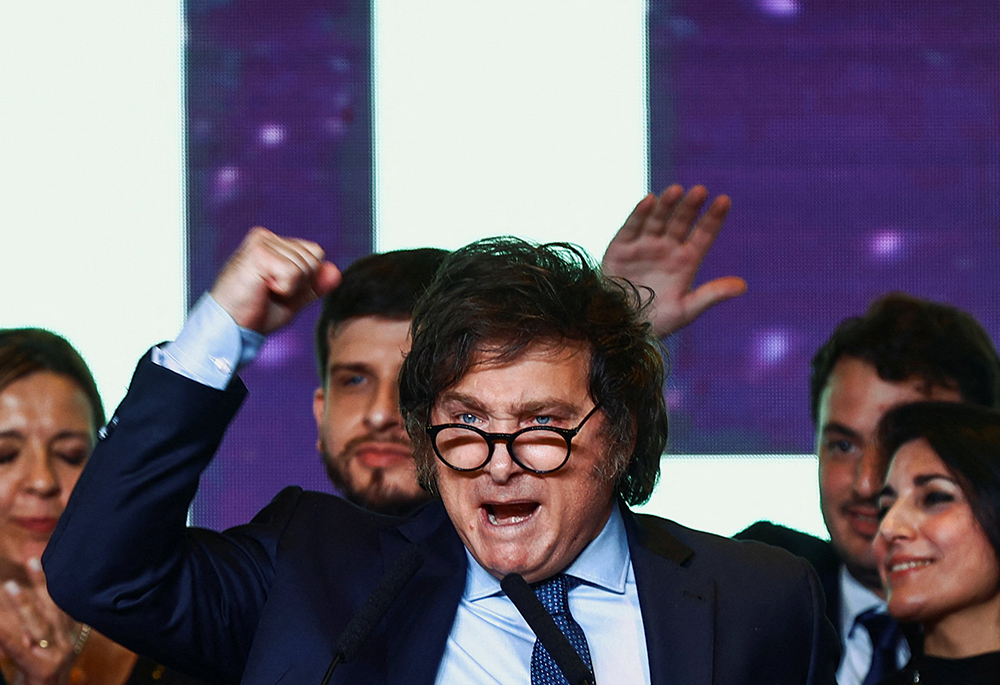
Argentine presidential candidate Javier Milei gestures to supporters as he reacts to the results of the presidential election Oct. 22 in Buenos Aires. The libertarian upstart claimed 30% of the vote, setting him up for a November runoff with Economy Minister Sergio Massa of the Peronist party, who won 36.7% of the vote. (OSV News/Reuters/Matias Baglietto)
As Argentina prepares to vote for its presidential runoff on Nov. 19, many Catholics, including popular clergy members, are not trying to hide the fact that they are organizing against far-right candidate Javier Milei, who has openly criticized and even insulted Pope Francis.
Milei, a self-defined anarcho-capitalist who wants to drastically reduce the size of the Argentine state, won 30% of the vote in the first round of the presidential election on Oct. 22.
One of the loudest voices against Milei has been Fr. José María "Pepe" di Paola, in charge of the Buenos Aires Archdiocese's team of "slum priests" (known in Spanish as curas villeros). Along with dozens of his colleagues, di Paola organized a Mass of reparation on Sept. 5, after Milei insulted Francis on several occasions during interviews and on social media.
In a Nov. 2 interview with the public radio outlet Télam referring to Milei, di Paola said that "no person of faith can lean toward inhuman electoral proposals." Despite the Argentine bishops' attempts to distance themselves from the priest — unnamed prelates recently told religious outlet Valores Religiosos that di Paola expresses only his personal opinions — many think that not only have the clergy been trying to intervene and defeat Milei, but even the pope has been doing so.
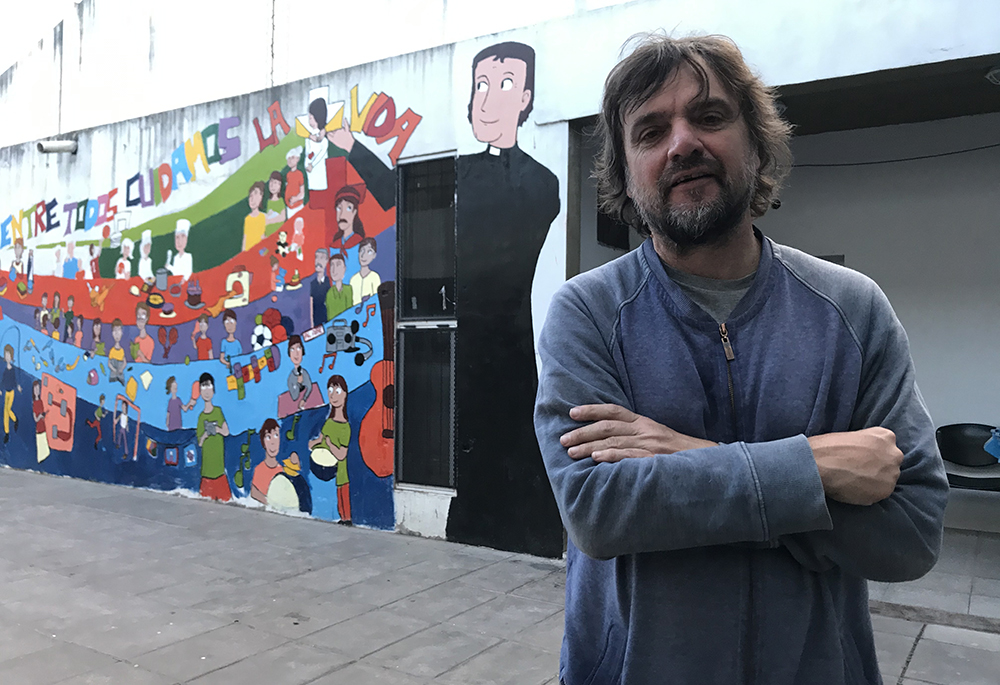
Fr. José María di Paola poses Oct. 6, 2019, outside St. John Bosco parish in Jose Leon Suarez, Argentina. (CNS/David Agren)
"Part of the church has been very clear about its repudiation of Milei," said sociologist Marcos Carbonelli, a researcher at Argentina's National Scientific and Technical Research Council, or CONICET, and an expert on the nation's religious dynamics.
"That segment has portrayed Milei as a diabolical figure, somebody who is against everything that comes from the popular classes," Carbonelli told NCR.
The sociologist said Milei has been the subject of many homilies at Masses across the country. He also pointed to the candidate's Sept. 30 visit to the city of Luján, which is home to the Basilica of Our Lady of Luján, Argentina's patron saint.
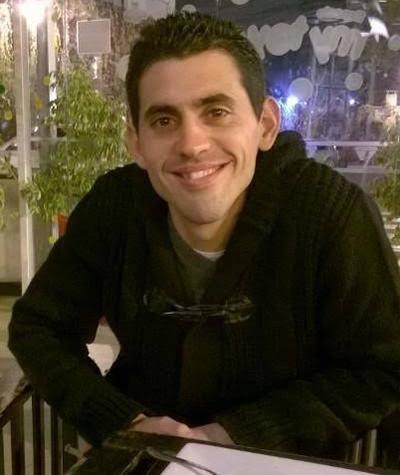
Marcos Carbonelli, sociologist and a researcher at Argentina's National Scientific and Technical Research (Eduardo Campos Lima)
During the visit, said Carbonelli, "one could see dozens and dozens of banners against Milei's ideas and defending the church's social doctrine."
An enthusiast of conservative economists like Friedrich Hayek and Ludwig von Mises, Milei gained notoriety in Argentina due to his appearances over the past decade on TV news shows, in which he would demonstrate his radical socioeconomic ideas.
Milei has often criticized Francis as a way of expressing his extreme views concerning the state's role in the economy.
Once, when Francis posted on social media that paying taxes is important because those funds can help the poor, Milei said the pope is always standing "on the side of evil." On another occasion, during a TV appearance in 2020, he criticized the pope for defending social justice and called the pontiff "the imbecile who is in Rome."
Spanish-born Fr. Paco Olvera, who is part of a movement called Priests for the Option for the Poor, said that, for Milei, "economic redistribution operated by the state is the work of the devil."
In Olvera's opinion, there is indeed a direct opposition between Milei's economic program and the Gospel.
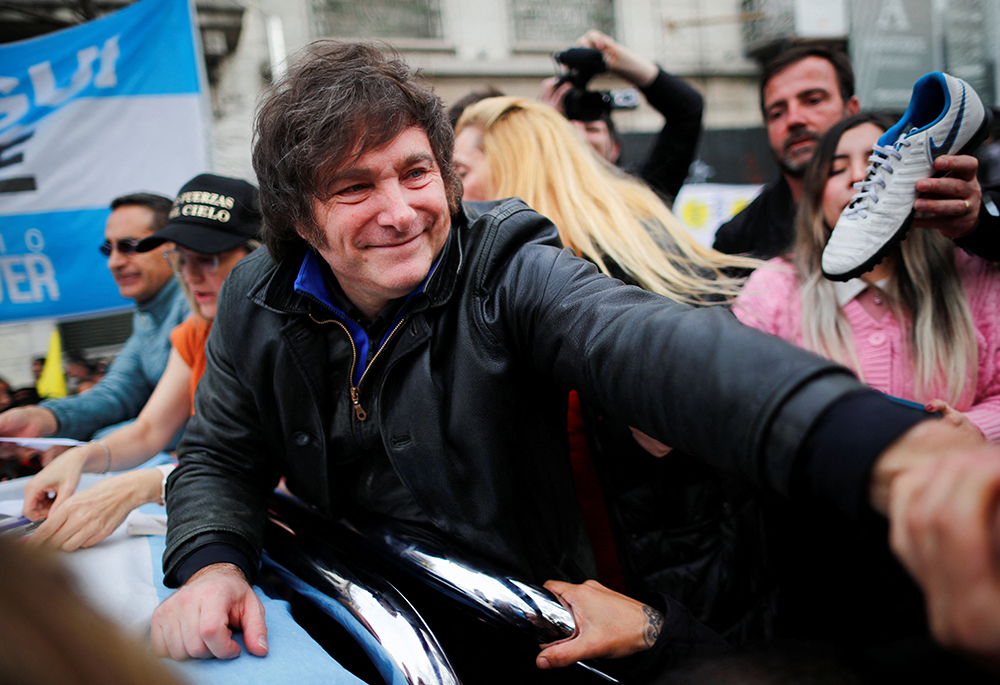
Argentine presidential candidate Javier Milei of La Libertad Avanza coalition greets supporters during a campaign rally Sept. 12 in Buenos Aires. (OSV News/Reuters/Agustin Marcarian)
"The most basic thing in the Gospel is fraternity. That man says that every person must take care of him or herself without support from the state," Olvera added.
Lay theologian Francisco Bosch, who accompanies basic ecclesial communities in Latin America, said Milei's candidacy has been the first time that Catholics of popular movements have had the collaboration of members of the hierarchy in organizing a campaign against a political candidate.
"That has been the most 'religious' of all Argentinian elections, despite the growing secularism in the country. Milei's attacks on Catholic social doctrine sparked a prophetic voice from the church," Bosch told NCR.
Bosch said that Francis himself gave an interview to Télam before the first round of elections, and seemed to refer to Milei, at least indirectly.
"I am very afraid of pied pipers because they are charmers. If they were snake charmers I would leave them alone, but they are people charmers ... and they end up making people drown," Francis told the radio outlet, adding that the country's economic crisis cannot be solved by "redeemers" with flutes.
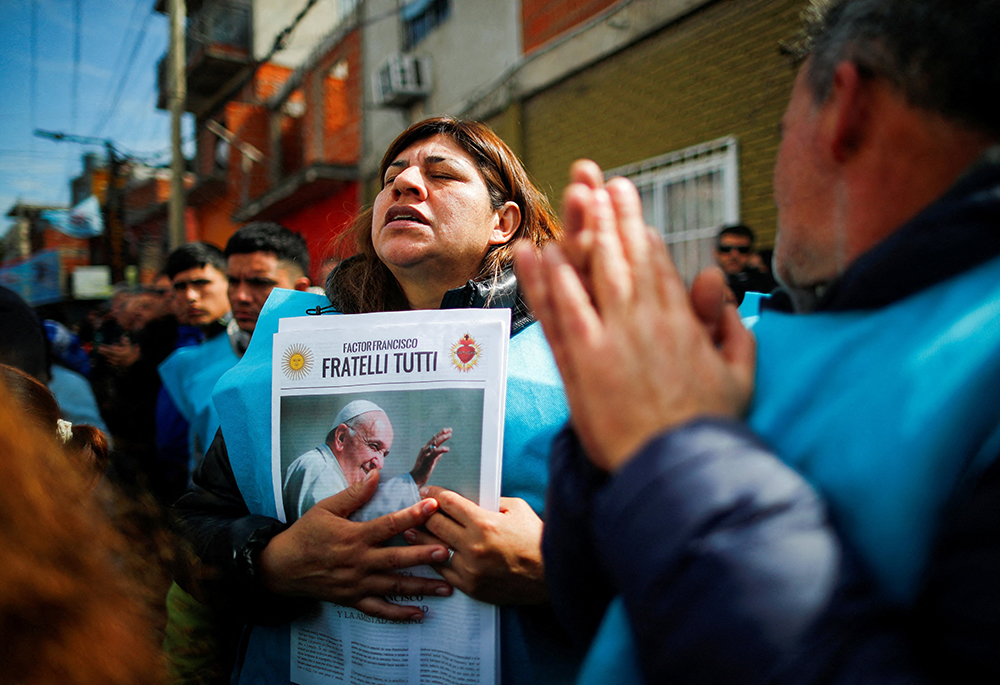
A woman prays while holding a newspaper with an image of Pope Francis during a Mass celebrated Sept. 5, to rebuff verbal attacks on the pontiff by presidential candidate Javier Milei, of La Libertad Avanza coalition, in Buenos Aires. (OSV News/Reuters/Agustin Marcarian)
That statement was taken in Argentina as a clear message against the radical proposals presented by Milei, which include adopting the U.S. dollar as the country's currency, shutting down the country's central bank, and cutting much of the government's spending.
Many analysts consider Milei's proposals to be totally impracticable, but his way of supporting them, combining an impressive public performance with sarcasm and cursing, has been drawing many enthusiasts, especially among young people.
In August, during the primary elections, Milei received the most votes of any candidate, with almost 30% support. Patricia Bullrich, a conservative former security minister, and Sergio Massa, the center-left candidate and current economic minister, were right behind him.
Many in the country thought that Milei would be the winner in the first round of elections, maybe even being elected without the need of a second round. But he ended up behind Massa, who first ran for president in 2015.
"There has been much more participation. A larger part of the voters is not willing to give Milei the power to rule our nation. His ideas are totally different from our political tradition," said Susana Traversi, a lay Catholic from Buenos Aires who took an active role in campaigning against the anarcho-capitalist candidate before the first round.
Argentine presidential candidate Economy Minister Sergio Massa addresses supporters as he reacts to the results of the presidential election in Buenos Aires Oct. 22, 2023. Massa, the Peronist party candidate, received 36.7% of the vote and faces a November runoff against candidate Javier Milei, a libertarian upstart who got 30% of the vote. (OSV News photo/Mariana Nedelcu, Reuters)
A member of a Catholic organization in the city of Avellaneda focused on promoting human rights, Traversi said that her group and other lay movements in the region promoted several marches and other activities to campaign against Milei.
"And we are now campaigning for Massa. Even people that have been impacted by the current economic crisis will vote for him," she said.
Traversi said that only in 1983, when the church played a central role in rebuilding the Argentine institutions after the military dictatorship, has she seen such an active participation of the clergy in politics.
"It's not the time for being neutral. That's why even priests have been criticizing him," she said.
Advertisement
Ana Belén Molina, a laywoman who works with base communities in Argentina's northeast Chaco province, said that many activists in the region have been visiting homes and talking to people about the risks of voting for Milei since the campaign started.
"The idea is to help people realize that Milei's government project is anti-Gospel, attacks the church's social doctrine and puts in danger 40 years of work to build up social rights," she said.
Molina said the pontiff's words during the campaign reached the souls of many Argentine Catholics, "especially when he alluded to the false prophets who try to deceive the poor people, who in fact they hate."
She said that she will keep dedicating herself to the effort until the second round of elections on Nov. 19, "raising our voices with clarity and evangelical coherence."







